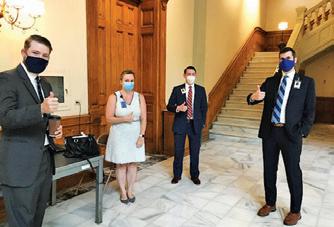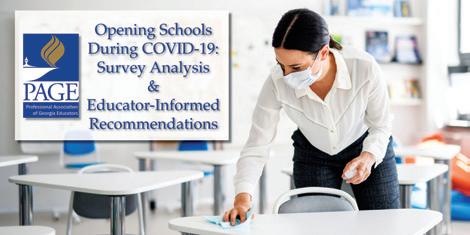
6 minute read
PAGE Legislative Team
PAGE Legislative Team Pivots to Quickly Assess and Advocate for Educator Needs
By Josh Stephens, PAGE Legislative Services Specialist
In March, the PAGE legislative team expanded its successful advocacy practices in response to the unprecedented, pandemic-triggered disruption of the 2020 legislative session as well as rapidly emerging policy issues. The team quickly engaged PAGE members to identify member concerns and promote those concerns with policymakers. The team highlighted issues that affect educators and students and advocated for policies that best support both groups with lawmakers, state and district educational leaders and other stakeholders. The PAGE team also connected with federal lawmakers to raise awareness of the impact of the COVID-19 pandemic in Georgia schools and the need for resources to protect student and educator health and safety and effectively respond to student academic and social-emotional needs.
Launch of the 2020 Legislative Session: Calm Before the Storm The 2020 session of the Georgia General Assembly began on the third Monday of January, as required by state law. Guided by member-identified legislative priorities, PAGE lobbyists tackled multiple issues including protecting the Teacher Retirement System, reducing the number of standardized tests, and advocating for a teacher pay raise proposed by Gov. Brian Kemp.
On March 12, legislators met for Crossover Day, the day by which all legislation must pass one chamber to remain eligible for passage into law. The day became more significant when House Speaker David Ralston (R-Blue Ridge) and Lt. Gov. Geoff Duncan announced that the General Assembly would suspend indefinitely after meeting once more, for legislative day 29 on March 13, due to the rapid spread of the COVID-19 virus. Kemp declared a public health state of emergency on March 14, and, on March 16, issued an executive order to close all public schools in the state.
‘A Most Unusual’ Recess: Listening to Members and Sharing Concerns The PAGE legislative team pivoted to provide opportunities for PAGE members to share feedback on the ever-changing K-12 education landscape created by the COVID-19 virus through two surveys: the COVID-19 Educator Impact Survey and COVID-19 Budget Impact Survey.
More than 15,300 teachers, administrators, and school personnel who participated in the COVID-19 Educator Impact Survey from March 20 to March 27 provided information about how school closings affected them and their students. Claire Suggs, PAGE senior education policy analyst, analyzed the survey results and produced a report describing these challenges, including issues with remote learning and how educators responded to the changes spurred by the COVID-19 pandemic.
From June 3 to June 8, Georgia educators shared concerns about the impact potential budget cuts could have on them and their students in the 2020- 2021 school year in the COVID-19
Budget Impact Survey. More than 9,100 educators participated in the survey, which captured their perspectives on state and local budget deliberations.
From districts across the state, educators cited additional supports that


students will need in response to the COVID-19 pandemic.
The team shared findings from both reports with lawmakers, educational leaders, the media and others who shape education policy decisions. Both reports are available on the PAGE website: www.pageinc.org.
On June 9, the PAGE legislative team coordinated a virtual town hall for PAGE members with State School Superintendent Richard Woods and members of the Georgia Department of Education (GaDOE) leadership team. Woods and GaDOE staff responded to questions from PAGE members about the impact of

COVID-19 on schools and shared their work to identify solutions to support Georgia schools during the pandemic. Over 200 PAGE members participated.
Alongside these opportunities, the PAGE legislative team continued to produce reports providing information on federal legislation and relief packages including the Families First Coronavirus Response Act (FFCRA) and the Coronavirus Aid, Relief, and Economic Security (CARES) Act. The FFCRA contains provisions for paid sick leave, free COVID-19 testing, expanded unemployment benefits, and increased access to food assistance programs. The CARES


Act contained the Elementary and Secondary School Emergency Relief Fund that provided crucial funding to school districts to spend on COVID-19-related costs, direct payments to many American citizens, and student loan relief for federal student loan payments. PAGE leadership delivered a letter to each member of the Georgia Congressional delegation calling for expanded federal relief funding for Georgia’s public schools.
Legislative Session Resumes: Masks, Distancing, Budget Cuts The General Assembly reconvened on June 15 for legislative day 30 with a completely different outlook amid an unprecedented pandemic and large-scale protests. Their biggest task was to complete the Fiscal Year 2021 budget. Lawmakers entering the Gold Dome, as well as staff and visitors, had their temperatures measured, and many wore masks. A mobile COVID-19 unit provided on-site virus testing. Discussion under the Gold Dome shifted from providing teachers a second pay raise and cutting the state income tax rate to how to cut the FY 21 budget to account for the loss of state revenue caused by the pandemic. The voucher expansion bill was held in the House. The PAGE legislative team attended most committee meetings in which legislation affecting public education was discussed while wearing masks and attempting to maintain safe social distances from legislators and other lobbyists.
The 2020 legislative session adjourned Sine Die on June 26 after legislators passed a budget that included a $950 million cut to Quality Basic Education (QBE) funding formula, the primary source of state funding for public schools. Though steep, it is a smaller cut than initially expected. The reduced cut comes after Gov. Kemp revised the state revenue estimate, forecasting a loss of $2.2 billion in FY 2021 instead of $2.6 billion. This adjustment, combined with an infusion of $250 million in state rainy day funds, lowered the cut applied to most state agencies to 10 percent from 11 percent. Lawmakers took a measured approach to developing the budget, keeping cuts to some programs below 10 percent and boosting funds for other programs.
Legislators also approved a bill that reduces the number of state-mandated standardized tests bringing Georgia’s testing program more in line with the minimum number of tests required by the federal government.
Visit the PAGE website at https:// bit.ly/2Q4hITw for FY 2021 budget highlights and a comprehensive list of education-focused legislation which passed the state House and Senate during this most unusual time.
Preparing for 2020-21: Opening Schools During a Pandemic At the conclusion of the legislative session, the PAGE legislative team launched a third member survey to gather perspectives about opening schools for the 2020-2021 school year. More than 16,000 Georgia educators responded and made clear that they are dedicated to their students and returning to schools but have great concern for the health and safety of their students and themselves. Drawing on these and other findings, PAGE issued recommendations to school districts regarding their opening plans. The recommendations include delaying the opening of schools until no sooner than mid-August, requiring face coverings, and, for districts in communities in which there is substantial spread of the virus, opening virtually. The PAGE recommendations were delivered to each local school superintendent on behalf of educators. The report and complete list of recommendations can be found on the PAGE website at https://bit.ly/32b4V97.
Advocating Beyond the Pandemic The PAGE legislative team continues to monitor local, state and federal responses to COVID-19 and will continue to provide information on federal packages that will impact educators. They will continue to seek the input of members each step of the way to guide future education policy decisions on the state and federal levels of government. The legislative team can be reached by sending an e-mail to legislative@pageinc.org or by calling the PAGE office at 770-216-8555. n










